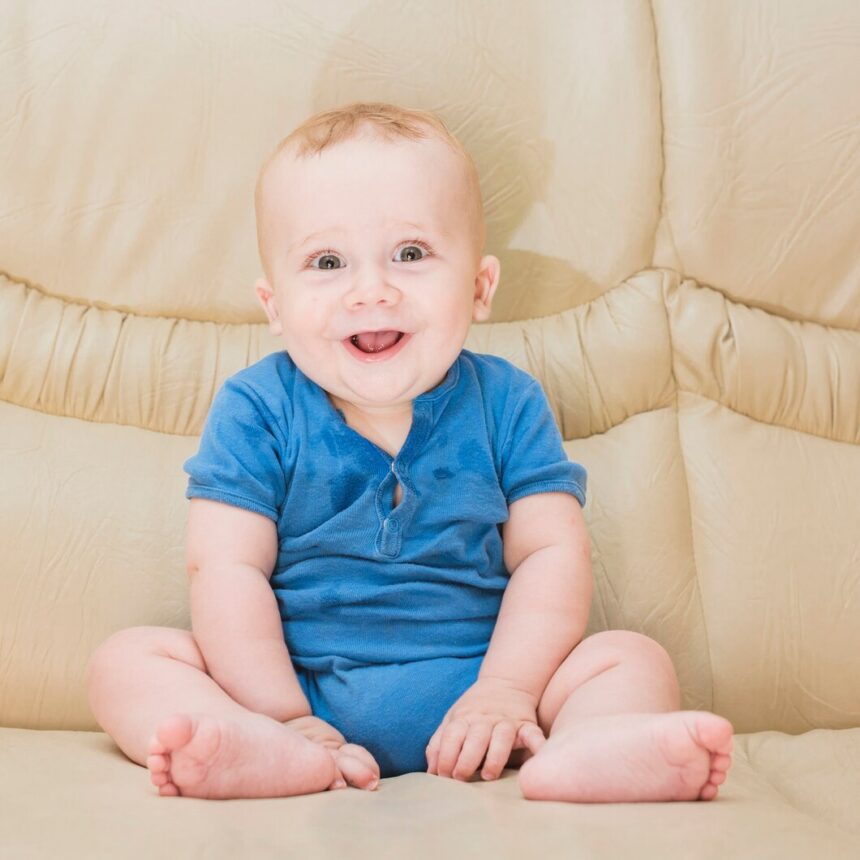The journey of a baby’s first year is filled with rapid growth and profound changes. By the time they reach six months, babies often exhibit a range of new skills and behaviors that reflect their development across various domains. Here, we explore the key milestones you can expect as your baby turns six months old.
Physical Development
Motor Skills
At six months, many babies have made significant strides in their motor abilities. They often:
- Sit with Support: Most babies can sit up with minimal support, and some may even start to sit independently for short periods.
- Rolling Over: By this age, rolling from front to back and vice versa becomes more coordinated.
- Reaching and Grasping: Improved hand-eye coordination allows babies to reach for and grasp objects, transferring them from one hand to another.
- Starting to Crawl: While not all babies start crawling at six months, many show signs of beginning to move forward or backward on their bellies.
Fine Motor Skills
Babies become more adept at using their hands and fingers. They may:
- Hold Small Objects: Babies can hold smaller items and explore them with their hands and mouths.
- Banging and Shaking: They enjoy banging objects together and shaking toys to produce sounds.
Cognitive Development
Object Permanence
Around six months, babies start to understand the concept of object permanence—the realization that objects continue to exist even when they are out of sight. This development is fundamental to cognitive growth and is often observed during play, such as when a baby looks for a toy that has been hidden under a blanket.
Exploring Cause and Effect
Babies at this stage enjoy experimenting with cause and effect. For instance, they may repeatedly drop a toy to see if you will pick it up or push buttons on a toy to make sounds or lights activate.
Recognition of Faces and Voices
Six-month-old babies can recognize familiar faces and voices, displaying excitement and joy when they see their parents or caregivers. They may also start to show wariness of strangers.
Language and Communication
Babbling
Babbling becomes more frequent and complex. Babies typically produce consonant-vowel combinations, such as “ba,” “da,” and “ma.” This is a crucial step toward forming words and sentences.
Responding to Names
Many babies begin to respond to their names around this age. They might turn their heads or smile when they hear their name called, indicating growing social awareness and recognition.
Expressive Sounds
Babies start to use different sounds to express their feelings. Laughter, squeals, and varied cries communicate happiness, frustration, or the need for attention.
Social and Emotional Development
Attachment
The bond between baby and caregiver strengthens. Babies seek comfort and security from familiar people, and may show preferences for certain individuals.
Mimicking Emotions
Babies are keen observers and start to mimic the emotions of those around them. They might smile when you smile or show distress if they sense sadness in you.
Interactive Play
Interactive play becomes more engaging. Babies enjoy games like peekaboo and pat-a-cake, which help develop their social skills and understanding of turn-taking.
Tips for Supporting Development
Engage in Play
Interactive and sensory play is vital. Use toys that stimulate sight, sound, and touch to foster curiosity and learning.
Encourage Movement
Give your baby plenty of supervised tummy time to strengthen muscles needed for crawling and other motor skills.
Talk and Read
Narrate your day, sing songs, and read to your baby regularly. This exposure to language supports their communication development.
Respond to Cues
Pay attention to your baby’s signals and respond to their needs. Consistent, loving responses build a secure attachment and support emotional development.
Each baby develops at their own pace, and while these milestones provide a general guideline, there is a range of what is considered typical development. Celebrate your baby’s unique progress and consult with your pediatrician if you have any concerns about their development. Enjoy the exciting journey of watching your baby grow and change during this remarkable stage of their life.










